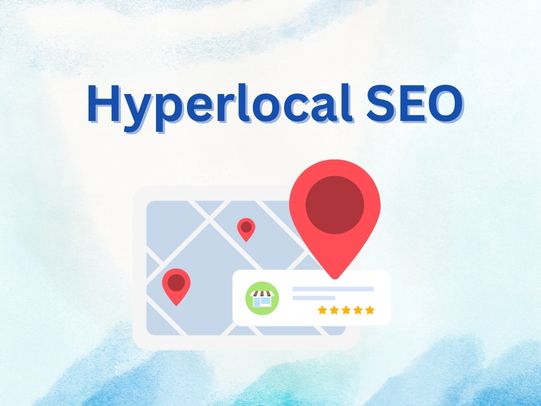In today’s digital landscape, local visibility is everything – especially for service-based businesses. But there’s a big difference between ranking in a city and ranking in a neighborhood. That’s where Hyperlocal SEO comes in.
If you’re a business owner, marketer, or SEO specialist wondering how to attract customers from a specific street, block, or zip code, this guide will walk you through how to rank right where your audience is-literally.
What Is Hyperlocal SEO?
Hyperlocal SEO is the practice of optimizing your website, content, and online presence to target very specific geographic areas-such as neighborhoods, zip codes, landmarks, or even a particular street.
While Local SEO might help you show up in search results for “plumbers in Chicago,”
Hyperlocal SEO is what helps you rank for:
✅ “emergency plumber near Wicker Park Chicago”
✅ “carpet cleaning service in Brooklyn Heights 11201”
✅ “List of Best Dentists Near Bakersfield California ”
Why Hyperlocal SEO Matters
1. Search Behavior Is Localized
More users are typing (or saying) things like:
- “near me”
- “open now”
- “best [service] in [neighborhood]”
Google’s algorithm now delivers results based on exact location, time, and intent.
2. Better Conversion Rates
Users searching with hyperlocal intent are ready to take action. If you show up in their neighborhood, they’re more likely to call, visit, or buy.
3. Less Competition
Targeting a city like “Los Angeles” is saturated. But ranking in “Silver Lake” or “Echo Park”? That’s a niche advantage.
How to Rank in Your Neighborhood: Step-by-Step Hyperlocal SEO Guide
1. Claim & Optimize Your Google Business Profile (GBP)
Your GBP is your most valuable local SEO asset.
- Add a complete business address with the correct neighborhood or zip code.
- Choose specific categories (e.g., “Mattress Cleaning Service” not just “Cleaning”).
- Include your exact service area (you can set radius or zip codes).
- Add photos of your service locations or storefront.
- Use keywords + neighborhood names in your business description.
Example: “We provide eco-friendly carpet cleaning in Midtown Manhattan and Hell’s Kitchen.”
2. Use Hyperlocal Keywords on Your Website
Include neighborhood-specific keywords in:
- Homepage (e.g., “Your Trusted Plumber in Capitol Hill, Seattle”)
- Title tags and meta descriptions
- Service pages (“Roof Repair in Logan Circle, Washington DC”)
- Blog posts (“Top 5 Tips for Gutter Cleaning in Queens Village”)
Pro Tip: Use Google’s “People also ask” and auto-suggestions to find exact hyperlocal phrases.
3. Create Location-Specific Landing Pages
If you serve multiple areas, create dedicated pages for each.
- Make sure each page is unique (avoid duplicate content)
- Add local testimonials, photos, maps, and service details
- Include internal links between these pages and your blog/homepage
Example:
URL: yoursite.com/carpet-cleaning-11215
Title: “Professional Carpet Cleaning in Park Slope, Brooklyn (11215)”
4. Publish Hyperlocal Content
Go beyond service pages. Blog about:
- Local news or events
- Neighborhood tips
- Community outreach or sponsorships
- Seasonal service advice (e.g., “Spring Cleaning in Pasadena: Top Tips”)
Example Blog Titles:
“Why We Love Working in Denver’s Highlands Neighborhood”
“Top 3 Things to Know Before Remodeling in Beacon Hill, Boston”
5. Use Structured Data (Schema Markup)
Add LocalBusiness schema to help Google understand your location and services. Include:
- Business name
- Address (with postal code and neighborhood)
- Service area
- Opening hours
6. Build Hyperlocal Citations & Backlinks
Get listed in neighborhood-level directories and link from:
- Local blogs or news sites
- Chamber of commerce listings
- Event sponsorships
- Community forums or bulletin boards
Example: A backlink from a “Downtown Asheville Business Association” is gold for a local florist.
7. Encourage Neighborhood-Based Reviews
Ask happy customers to mention their neighborhood in reviews.
Example: “Great lawn care service in Capitol Hill. They showed up on time and did an amazing job!”
Reviews with local mentions help both Google and other users trust your relevance.
Example: Cleaning Business in Suburban Atlanta
Business: EcoShine Carpet Cleaning
Target: Sandy Springs, Georgia
What they did:
- Created pages for Sandy Springs, Dunwoody, and Brookhaven
- Blogged about “Cleaning Before Fall Festivals in Sandy Springs”
- Sponsored a local Little League team (linked from their site)
- Got reviews mentioning the neighborhood directly
Result:
A 70% increase in organic calls from within their exact zip code over 3 months.
FAQ
Q1: Can I rank in multiple neighborhoods?
Yes-if you have useful, relevant, and unique content for each. Avoid duplicate content across city pages.
Q2: What if I don’t have a storefront?
You can still rank by setting a service area in Google Business Profile and focusing your SEO on that neighborhood.
Q3: Should I include neighborhood names in my keywords?
Absolutely. That’s what separates you from city-wide competition. Include them naturally in titles, headings, URLs, and content.
Q4: How soon will I see results?
Typically 3–6 months if you’re consistent. Ranking locally can happen faster than national SEO because of lower competition.
Q5: Can hyperlocal SEO work for online-only businesses?
It’s best for service-based or brick-and-mortar businesses, but if you run local events, shipping, or support in specific areas, you can still benefit.
Final Thoughts: Go Deep, Not Wide
Hyperlocal SEO isn’t about being everywhere – it’s about being exactly where your customers are.
By focusing on neighborhood-level relevance, creating targeted content, and building local trust signals, you can outshine bigger competitors who ignore the value of specificity.
In a world of personalized search, the neighborhood is the new page one.
Related Articles:
How to Drive Traffic to a New Blog: Step-by-Step Guide
What Is ‘AI Overviews’ and How Does It Affect Organic Traffic?


